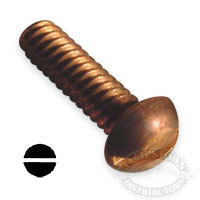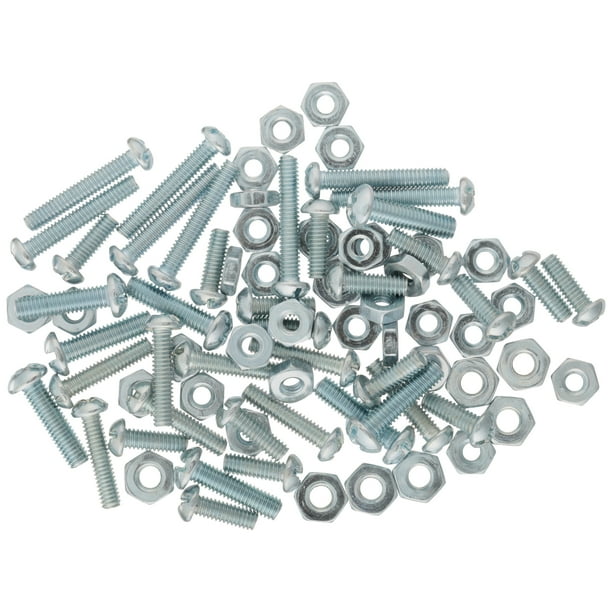8-32 Machine Slotted Screw Positive Stop
Understanding Standard Size Dimensions
#8-32 silicon bronze machine screws with round head and slotted or straight slot drive. The Round Head has a semi-elliptical top surface with a flat bearing surface underneath. The flat bearing surface allows for lateral movement (as opposed to a Flat or Oval Head that have a countersunk bearing surface that will self-center in the mounting holes) when attaching hardware. 8/32 Threaded Screws have a thread diameter of #8 (0.16 inches); and 32 threads per inch. Subcategories in 8/32 UNC Threaded Screws 8/32 UNC Headless Stud Screws. Drywall Screws (44) Ground Screws (35) K-Lath Screws (31) Lag Screws (44) Machine Screws (253) Wallplate Screws Self Drilling Screws (80) Sheet Metal Screws - Hex Head - Slotted (101) Sheet Metal Screws - Stainless - Pan Head - Square Drive (11) Screw Kits (22) Wood Screws (21).
The Size Dimension pertains to diameter of screws, bolts, & pins and inner diameter of nuts and washers. You may search for your product based on diameter by selecting a measurement on the Size dropdown. Other size measurements, such as screw, bolts, pin length, the outer diameters of nuts & washers, etc., appear on the search result itself.
A. Parts that Require Matching with a Mating Item
For example: Screws or bolts that drill through nuts, washers
Those parts that require matching with a mating item - screws or bolts with nuts or washers - have diameters that are denominated in actual inches or fractions thereof, followed by the number of threads per inch.
Slotted Head Screw
Screws and bolts that mate with a nut, as well as the nuts themselves, are denominated as such. Washers are not.
It is important to note that when matching a washer with a screw or a bolt, the diameter of the shaft of the screw or bolt should be matched to the inner diameter of the washer. For example, a ¾-16 bolt should be matched with a ¾ washer. The inner diameter of the ¾? washer will, in fact, be slightly larger than ¾? thereby enabling the washer to fit around the bolt. Consequently, when ordering a washer for a use other than matching it to a screw or a bolt, one should determine the actual inner iameter of the washer before placing an order.
Examples:
1. A fraction followed by a hyphen, followed by a number:
The fraction is the diameter of the shaft, in fraction of an inch. The number following the hyphen is the number of threads per inch, that is, the number of threads on the shaft itself, per inch of shaft length.

1/4-20: One quarter inch shaft diameter, 20 threads per inch
3/4-16: Three quarter inch shaft diameter, 16 threads per inch
2. For parts 1 inch or larger:
A number 1 or number larger than one, or number one or number larger than one followed by a fraction, then followed by a hyphen then a fraction or whole number:
The number 1 or number larger than one, or number one or number larger than one followed by a fraction, is the diameter of the shaft. The number following the hyphen is the number of threads per inch; that is, the number of threads on the shaft itself, per inch of shaft length. Same as for smaller parts.
1-12: One inch shaft diameter, 12 threads per inch
2-1/4-4-1/2: Two and one quarter inch shaft diameter, four and a half threads per inch
Note: The diameters of some smaller machine screws (though they may take a mating part), are denominated with the industry Numeric Size system described below. See section C below for clarification.
B. Parts that do not Require Matching with a Mating Item
Those parts that do not require matching with a mating item - screws or bolts that simply drill into or through a surface - are often denominated by industry Numeric Sizes preceded by a # sign. These do not show a number of threads-per-inch designation. These industry Numeric Sizes run from #0 through #15, with #0 the smallest and #15 the largest.
These Numeric Sizes are shaft diameters (and inner diameters of some washers) that were standardized years ago by the American Society of Mechanical Engineers (ASME), American Society of Testing & Materials (ASTM), and other standards bodies. These sizes were standardized based on sizes already commonly in use in the market.
1. Examples:
An industry Numeric Size, preceded by a # sign:
#6: A Number 6 size (sheet metal screws, Teks screws, drywall screws, particle board screws, wood screws, U-drive screws)
#8: A Number 8 size (sheet metal screws, Teks screws, drywall screws, particle board screws, wood screws, U-drive screws)
#14: A Number 14 size (sheet metal screws, Teks screws, wood screws)
2. Basic Major Diameters of industry Numeric Size-denominated screws:
(in inches)


#0: 0.0600 or 3/50 in
#1: 0.0730 or 73/1000 in
#2: 0.0860 or 43/500 in
#3: 0.0990 or 99/1000 in
#4: 0.1120 or 14/125 in
#5: 0.1250 or 1/8 in
#6: 0.1380 or 69/500 in
#7: 0.151 or 77/512
#8: 0.1640 or 41/250 in
#9: 0.1770 or 11/64 in
#10: 0.1900 or 19/100 in
#12: 0.2160 or 27/125 in
#14: 0.2500 or 1/4 in
#15: 0.3120 or 5/16 in
#16: 0.3750 or 3/8 in
Numeric Size denominations larger than #16 are uncommon.
Diameters are based on ASME Coarse Thread Series (UNC/UNRC) and ASME Fine Thread Series (UNF/UNRF)
C. Machine Screw Diameters denominated with the industry Numeric Size system
The diameters of smaller machine screws are denominated with the same Basic Major Diameters of industry Numeric Size-denominated screws noted in section B. 2. above, but with a number of threads per inch count as well. Here follows a list, in inches:
2-56: 0.0860 or 43/500 in diameter; 56 threads per inch
4-40: 0.1120 or 14/125 in diameter; 40 threads per inch
5-40: 0.1250 or 1/8 in diameter; 40 threads per inch
6-32: 0.1380 or 69/500 in diameter; 32 threads per inch
8-32: 0.1640 or 41/250 in diameter; 32 threads per inch
10-32: 0.1900 or 19/100 in diameter; 32 threads per inch
10-24: 0.1900 or 19/100 in diameter; 24 threads per inch
12-24: 0.2160 or 27/125 in diameter; 24 threads per inch